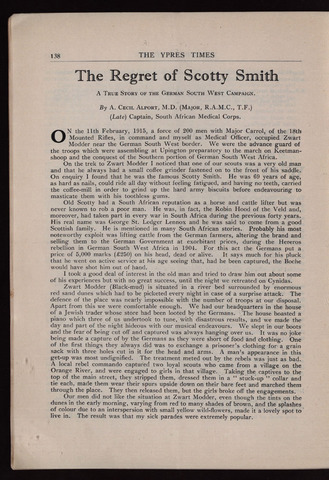138
THE YPRES TIMES
A True Story of the German South West Campaign.
By A. Cecil Alport, M.D. (Major, R.A.M.C., T.F.)
(Late) Captain, South African Medical Corps.
ON the 11th February, 1915, a force of 200 men with Major Carrol, of the 18th
Mounted Rifles, in command and myself as Medical Officer, occupied Zwart
Modder near the German South West border. We were the advance guard of
the troops which were assembling at Upington preparatory to the march on Keetman-
shoop and the conquest of the Southern portion of German South West Africa.
On the trek to Zwart Modder 1 noticed that one of our scouts was a very old man
and that he always had a small coffee grinder fastened on to the front of his saddle.
On enquiry I found that he was the famous Scotty Smith. He was 69 years of ag^,
as hard as nails, could ride all day without feeling fatigued, and having no teeth, carried
the coffee-mill in order to grind up the hard army biscuits before endeavouring to
masticate them with his toothless gums.
Old Scotty had a South African reputation as a horse and cattle lifter but was
never known to rob a poor man. He was, in fact, the Robin Hood of the Veld and,
moreover, had taken part in every war in South Africa during the previous forty years.
His real name was George St. Ledger Lennox and he was said to come from a good
Scottish family. He is mentioned in many South African stories. Probably his most
noteworthy exploit was lifting cattle from the German farmers, altering the brand and
selling them to the German Government at exorbitant prices, during the Hereros
rebellion in German South West Africa in 1901. For this act the Germans put a
price of 5,000 marks (£250) on his head, dead or alive. It says much for his pluck
that he went on active service at his age seeing that, had he been captured, the Boche
would have shot him out of hand.
I took a good deal of interest in the old man and tried to draw him out about some
of his experiences but with no great success, until the night we retreated on Cynidas.
Zwart Modder (Black-mud) is situated in a river bed surrounded by enormous
red sand dunes which had to be picketed every night in case of a surprise attack. The
defence of the place was nearly impossible with the number of troops at our disposal.
Apart from this we were comfortable enough. We had our headquarters in the house
of a Jewish trader whose store had been looted by the Germans. The house boasted a
piano which three of us undertook to tune, with disastrous results, and we made the
day and part of the night hideous with our musical endeavours. We slept in our boots
and the fear of being cut off and captured was always hanging over us. It was no joke
being made a capture of by the Germans as they were short of food and clothing. One
of the first things they always did was to exchange a prisoner's clothing for a grain
sack with three holes cut in it for the head and arms. A man's appearance in this
get-up was most undignified. The treatment meted out by the rebels was just as bad.
A local rebel commando captured two loyal scouts who came from a village on the
Orange River, and were engaged to girls in that village. Taking the captives to the
top of the main street, they stripped them, dressed them in a stuck-up collar and
tie each, made them wear their spurs upside down on their bare feet and marched them
through the place. They then released them, but the girls broke off the engagements.
Our men did not like the situation at Zwart Modder, even though the tints on the
dunes in the early morning, varying from red to many shades of brown, and the splashes
of colour due to an interspersion with small yellow wild-flowers, made it a lovely spot to
live in. The result was that my sick parades were extremely popular.

